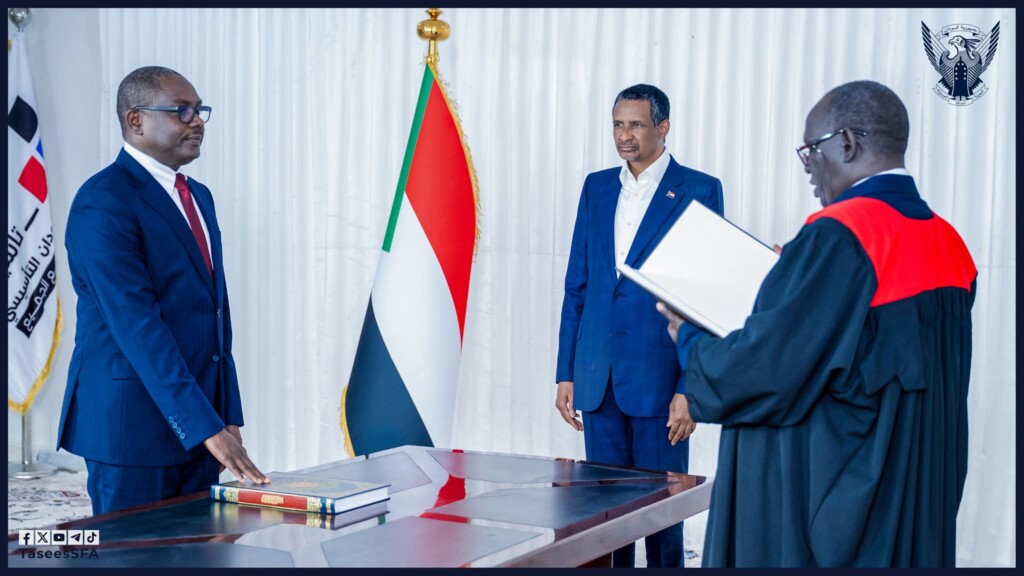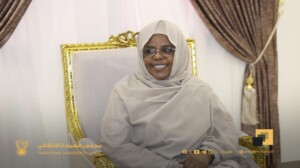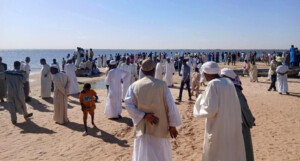As ‘Founding Government’ takes office in Nyala, does Sudan face a Libyan or Somali scenario?

Mohamed Hassan El Tawashi takes the oath of office as Prime Minister of the ‘Founding Government’ in Nyala yesterday (Photo: Presidential Council)
The swearing-in of members of the Presidential Council of the “Founding” government headed by Rapid Support Forces (RSF) leader Lt Gen Mohamed Hamdan Dagalo (Hemedti) and his deputy Abdelaziz El Hilu in Nyala on Saturday, and Mohamed Hassan El Tawashi’s swearing-in as Prime Minister yesterday in Nyala, raises concerns about the future of the political scene in Sudan.
‘Political team
The governor of the Darfur region, Minni Arko Minawi, says that the RSF government in Nyala is nothing but a political team; it is true that the absence of water is true, but it nullifies when the water is returned, and water here is the power of the legitimate state.”
He adds in a post on the ‘X’ platform: “The government of Sudan bears the burden of failing to nullify falsehood in its time, despite the abundance of nullification tools.”
‘A failed move’
Mohamed Zakaria, spokesman for the Democratic Bloc and the Justice and Equality Movement, downplays the step of forming a Founding Government, describing it as a failed step that will not change anything in the Sudanese state remaining unified with its army and institutions.
He calls the move a “desperate manoeuvre” after the military and political defeats suffered by the RSF.
Speaking to Radio Dabanga, he adds that the step of forming a constituent government in Nyala is a political impotence and moral bankruptcy and will have no impact on the ground except more isolation.
He said that the support of the African Union, represented by the African Peace and Security Council, for Sudan and its sovereignty and the rejection of the parallel government, as well as the position of the Arab League, which affirmed its support for the Sudanese government, confirms the isolation of the Tawasis alliance and its government, which has failed to obtain any recognition or legitimacy.
He stresses that the unity of Sudan is a red line, and neither conspiracies nor gel bodies will harm it, as he put it.
‘The birth of the Second Republic’
Suleiman Sandal, a leader of the Tawasis Coalition, said that the announcement of the Founding Government is “the birth of the Second Republic on the ruins of the failed First Republic, which inherited wars, hatred, racism and underdevelopment to the Sudanese people”.
He stresses that the goal justice, liberation of all of Sudan from the grip of what he calls the Port Sudan Group and terrorist groups to be under the banner of the Second Republic, so that the slogans of unity, freedom, peace, justice and equality can fly, and that the Sudanese people can exercise sovereignty over their land and resources and enjoy them.
Partition project in case of war
Journalist and political analyst Othman Mirghani said that the step of announcing the Presidential Council and taking the oath of office of a constituent government reflects the repercussions of the war rather than a really serious step to announce a government that can be effective, active, acceptable, and recognised regionally and internationally.
However, at the same time, he expects that this step would be a partition project if the war continued longer than it is now, indicating that the war will be created in a new form the longer it lasts, and will lead to the emergence of new agendas, including the development of the idea of a parallel government into an independent state, which will lead to the entry of all of Sudan, not only Darfur, into the partition tunnel.
Mirghani did not rule out that the repercussions will extend to neighboring countries, especially the east and west, and this may have effects on the African continent.
He adds: “Therefore, the African Union, through the Peace and Security Council, hastened to reject this step from the first day of its announcement, and repeated this more than once in more than one statement, as well as the United Nations, some other organizations, and important countries such as the United States of America, Egypt, Saudi Arabia and others, all of which have announced their rejection of this step, because its effects are greater than the borders of Sudan.”
He also predicts that this move will provoke a lot of controversy within the Sudanese political community, leading to a kind of new political polarization.
He said that a constituent government will become a negotiating card, especially since the negotiations and political settlement that the international community is working on led by the United States, Saudi Arabia, Egypt and the United Arab Emirates (the International Quartet) have begun to approach rapidly, which confirms the need for political cards, and this will be one of the cards used by the RSF.
Scenarios
Political analyst Mohamed Abdullah Turchin believes that this step puts the country in front of two main scenarios at the external and internal levels.
International or Partial Regional Recognition
The first scenario is that this government receives some kind of international or regional recognition, albeit not completely. Turshin points out that some regional powers and neighboring countries may recognize this government because of their immediate interests. He cites similar models, such as the government of eastern Libya recognised by countries such as Egypt and the United Arab Emirates, or the practical treatment of it as a power on the ground by other countries such as France and Russia.
According to this analysis, the RSF may not receive legitimate recognition that would allow it to open diplomatic missions, but it will be treated as a de facto and influential force on the ground, especially in resource-rich areas it controls.
The importance of Sudan and its resources, especially in Darfur, makes it difficult to ignore the dominant power there, given its direct impact on neighboring countries such as Libya, the Central African Republic and South Sudan.
He points to the case of ‘Somaliland, which has not received full international recognition, but is being dealt with by countries such as the UAE due to its importance in securing navigation in the Red Sea.
This model may apply to the Rapid Support Government, where the regional powers that support it will push to deal with it as a practical partner to achieve their interests.
Popular acceptance is contingent on services
Domestically, Torshin argues that the government’s future depends heavily on its ability to win the approval of citizens, which is linked to the provision of basic services and security.
The RSF faces a major challenge due to the crimes and abuses it has committed in the past, which makes it rejected by a large segment of civilians.
However, if this new civilian government succeeds in providing security and restoring basic services such as health, education, electricity, and water, it could gain the trust of citizens.
If the government succeeds in doing so, apologizes for past abuses and makes genuine reconciliations, the reality could change completely.
Challenges of failure
Turshin presents a scenario of failure, both externally and internally.
Externally: The second scenario is the lack of official recognition of the new government, as the United Nations and international law recognize the existing Sudanese government as the legitimate government. This would prevent any international influence or recognition of the new government. According to Turchin, some parties have an interest in Sudan remaining united and will work with all their influence to achieve this.
Internally: The second scenario is the failure of the Rapid Support Forces to provide services, the continuation of violations, and the inability of the military institution to control its personnel. According to Turchin, the failure of the previous civil administration formed by the RSF to achieve any achievement, coupled with the continuation of violent practices based on tribal and ethnic loyalty, will lead to complete popular rejection and the inevitable failure of their project.
In conclusion, Dr. Turshin emphasizes that the success of either scenario depends on the ability of each party to market and promote itself, both internationally and domestically, and provide concrete evidence of its ability to run the country.
Two illegitimate governments
Yasser Arman, head of the Popular Movement-Revolutionary Current, believes that it would have been more useful for the Establishment Alliance to be content with forming a civil administration, a John Garang has done for more than twenty years, although the two experiences are different.
He said that the formation of a government will harm a coalition that was established before harming and dividing Sudan and called on both sides of the war to move towards peace instead of forming two governments that do not enjoy legitimacy and cannot unite the Sudanese people.
Fragmentation warnings
Khaled Omar Youssef, a leader in the “Resilience” coalition, said that the danger in the current scene is that the division of the fait accompli that is taking place now is not sustainable, as the two camps that share power lack cohesion and homogeneity, and within them there are great contradictions.
He explained that this division is only a first step towards fragmentation, not just division. This fragmentation will be paid dearly by the people of Sudan, as the cycle of wars, violence and divisions will continue, with its meaning of death, refuge, displacement, and destruction for all the people of Sudan, and it will affect the countries of the ocean.”











 and then
and then